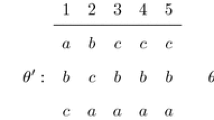Abstract
We consider a social choice problem in various economic environments consisting of n individuals, 4≤n<+∞, each of which is supposed to have classical preferences. A social choice rule is a function associating with each profile of individual preferences a social preference that is assumed to be complete, continuous and acyclic over the alternatives set. The class of social choice rules we deal with is supposed to satisfy the two conditions; binary independence and positive responsiveness. A new domain restriction for the social choice rules is proposed and called the classical domain that is weaker than the free triple domain and holds for almost all economic environments such as economies with private and/or public goods. In this paper we explore what type of classical domain that admits at least one social choice rule satisfying the mentioned conditions to well operate over the domain. The results we obtained are very negative: For any classical domain admitting at least one social choice rule to well operate, the domain consists only of just one profile.
Similar content being viewed by others
References
Arrow KJ (1963) Social choice and individual values. Wiley, Second Edition, New York
Bergstrom TC (1975) Maximal elements of acyclic relations on compact sets. J Econ Theory 10: 403–404
Blair DH, Pollak RA (1982) Acyclic collective choice rules. Econometrica 50: 931–943
Bordes G, LeBreton M (1989) Arrovian theorems with private alternatives domains and selfish individuals. J Econ Theory 47: 257–281
Bordes G, LeBreton M (1990) Arrovian theorems for economic domains: the case where there are simultaneously private and public goods. Soc Choice Welfare 7: 1–17
Bordes G, Salles M (1978) Sur l'Impossibilie des fonctions de decision collective: un commentaire et un resultat. Rev Econ Polot 88: 442–448
Campbell DE (1990) Can equity be purchased at the expense of efficiency?: an axiomatic inquiry. J Econ Theory 51: 32–47
Campbell DE (1992a) Transitive social choice in economic environments. Int Econ Rev 33: 341–352
Campbell DE (1992b) Implementation of social welfare functions. Int Econ Rev 33: 525–533
Campbell DE (1992c) Equity, efficiency, and social choice. Clarendon Press, Oxford
Campbell DE (1992d) Public goods and Arrovian social choice. Soc Choice Welfare 9: 173–183
Fountain J, Suzumura K (1982) Collective choice rules without the Pareto principle. Int Econ Rev 23: 299–332
Kelsey D (1984) Acyclic choice without the Pareto principle. Rev Econ Stud 51: 693–699
Mas-Colell A (1985) The theory of general economic equilibrium; A differentiable approach. Cambridge University Press, Cambridge
Mas-Colell A, Sonnenschein H (1972) General possibility theorems for group decisions. Rev Econ Stud 39: 185–192
Nagahisa R (1991) Acyclic and continuous social choice in T 1-connected spaces: including its application to economic environments. Soc Choice Welfare 8: 319–332
Nagahisa R (1995) A full proof of identification theorem on domain restrictions over which acyclic, continuous-valued, and positive responsive social choice rules operate. Mimeo
Redekop J (1991) Social welfare functions on restricted economic domains. J Econ Theory 53: 396–427
Redekop J (1993a) Arrow-inconsistent economic domains. Soc Choice Welfare 10: 107–126
Redekop J (1993b) Social welfare functions on parametric domains. Soc Choice Welfare 10: 127–148
Suzumura K (1983) Rational choice, collective decisions, and social welfare. Cambridge University Press, London
Walker M (1977) On the existence of maximal elements. J Econ Theory 16: 470–474
Author information
Authors and Affiliations
Rights and permissions
About this article
Cite this article
Nagahisa, Ri. Identification of domain restrictions over which acyclic, continuous-valued, and positive responsive social choice rules operate. Soc Choice Welfare 13, 383–395 (1996). https://doi.org/10.1007/BF00182850
Received:
Accepted:
Issue Date:
DOI: https://doi.org/10.1007/BF00182850




